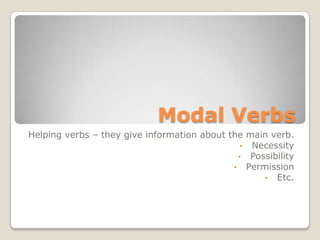
Modal verbs...
- 1. Modal Verbs Helping verbs – they give information about the main verb. • Necessity • Possibility • Permission • Etc.
- 2. Can: Natalie can play tennis today. (ability or permission) Could: They could play the guitar. (Formal of “can”) May: It may be a nice day tomorrow. (possibility) Might: It might be a nice day tomorrow. (possibility) Modal + Simple Form
- 3. Should: Natalie should go outside. Ought to: You ought to tell her how you feel! Had better: They had better be on time. Must: He must eat all his food. Have to: I really have to study for my exam.
- 4. Similar meaning about obligation MUST: Usually used for feelings and wishes of the speaker. ◦ I must stop smoking. (I want to) HAVE TO: Usually obligations that come from „outside‟ ◦ I have to stop smoking (The doctor ordered me) Must / Have to?
- 5. They have the same meaning in most situations (suggestion or recommendation) SHOULD: Suggestion or advice about the best thing for them. ◦ You should tell her how you feel. OUGHT TO: Suggesting something they can‟t avoid or the last option. ◦ You ought to tell her how you feel. Should / Ought to?
- 6. Make suggestions or recommendations ◦ You had better take your umbrella with you today. Warning ◦ You had better be careful with the way you talk to me in the future! Show desperation (hope). ◦ The bus had better arrive on time or I‟ll be late for work! Had better!
- 7. You should clean your room, it is very messy. You ought to clean your room, your girlfriend is coming to visit you. You had better clean your room, or you will be grounded! Levels of severity